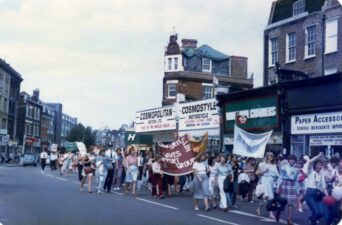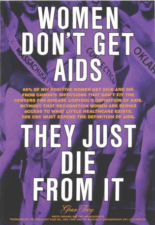Ruth Beazley has generously provided the following excerpt from her book. The layout is slightly compromised in transferring the text and photos to the blog format. WHN Admin.
‘Stansfield Grange. Home of the Triangle Mill Sisters’
This book traces the history of Stansfield Grange over a period of 350 years. The adjacent Stansfield Mill undertook wool fibre processing and its impact on the village of Triangle in West Yorkshire is described. Between the 1920s and 1970s The Grange was a hostel for one hundred women mill workers and first hand accounts are given about hostel life.
The book can be obtained for £5 + p&p by e mailing ruth.beazley@btopenworld.com
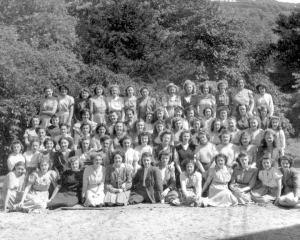
1950s Hostel photo
A healthy life
‘It was a healthy life in my day.’ (1930s) ‘We were in the country! We would sit in the garden after work and have a picnic.’ (1950s)
The contrast between urban mills and those in rural settings was not lost on the hostel women. They appreciated living in a spacious, beautiful centrally heated house with well cared for gardens, in rural surroundings where it was a pleasure to relax and enjoy themselves.
‘The hostel was a beautiful old house [with] a sun room and absolutely beautiful gardens.’ (1950s)
In the 1920s, there is a report of compulsory Sunday School attendance on Sunday mornings, but afterwards a weekly treat was to walk up onto the moors to Ladstone Rock or in the woods.
‘The food was adequate for them days. It was all rationed but we never seemed to go hungry. My favourite meal was bacon, canned tomatoes and fried bread – with a scoop of grease over the top.’ (1940s)
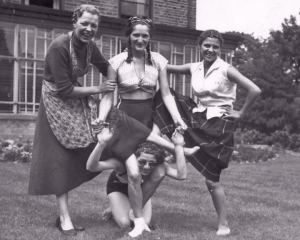
Women enjoying the garden
Benefits for the women
A number of improvements were made to the Grange over the years. In 1943, an extension provided seventeen new bedrooms and bathrooms to all three floors, a drying room and a recreation room on the ground floor. In 1950, a sun room/lounge was added to the original building.

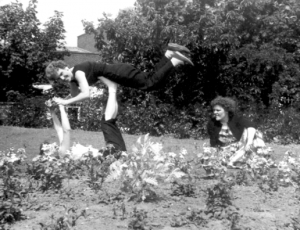
Baths were a particular luxury. In the 1930s, they were usually a weekly event, but by the 1950s the women could have a daily bath if they wished.
‘There was a row of baths with curtains [but] if there was a dance on we were all rushing round … [We’d] flip the curtains and there we were in the ‘all together’… washing our hair and making up.'(1940s)
‘It was noisy but the camaraderie among everyone was great.’ (1950s)
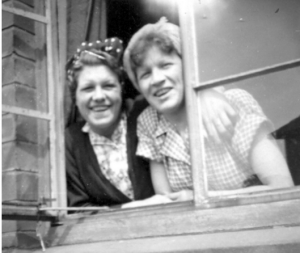
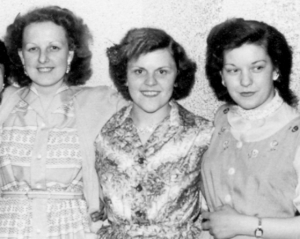
The Hostel was generally a happy place, alive with music, song and above all, dance. The women were passionate about dancing and would teach each other to dance in the dining room after their evening meal.
In the winter months, Illingworth Morris arranged for the hostel to have its own dance band on Friday nights and the women would go dancing in Sowerby Bridge at the weekends.
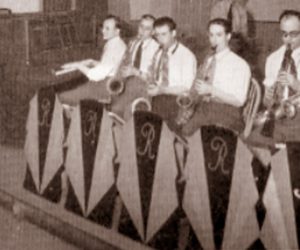

The company also paid for eighteenth and twenty-first birthday parties and wedding receptions. One of the managing directors would stand in for the bride’s father if he was not available, to ‘give her away’.
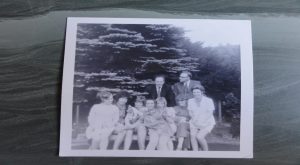
Aubrey Hall and Gordon Hill in the garden with some of the women, 1960s
‘Mr Hall would often play the piano and organise a sing-song.’ (1940s)
Managers were very good to the women and were proud of ‘their girls’. There was a ‘family’ culture in the firm, and genuine care and concern shown for the women’s well being. Aubrey Hall (Managing Director) and Gordon Hill (Company Director) were frequent visitors at the Stansfield Grange.
Transport was provided to take the young women home at holiday times, if they became ill or if there was an emergency at home. For example, travel was arranged for anybody who had a relation affected by a pit fall, such as the Easington mining disaster in 1951.
Coaches were provided to take the women home.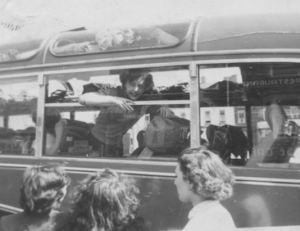
Between the 1930s and the 1950s, summer ‘days out’ to Blackpool were arranged and a train was chartered from Sowerby Bridge station. Parents were also offered accommodation when they visited their daughters.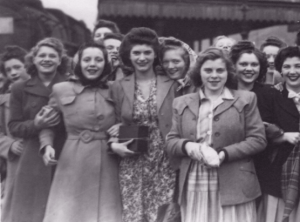
Waiting for the train on a Summer day trip to Blackpool about 1950
The hostel years showed how a mutually respectful and supportive relationship between managers, workers and the community could result in a happy working life for everyone, given a healthy economic climate.
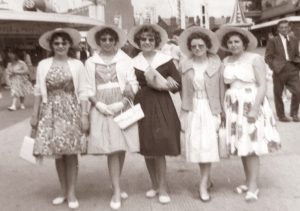
On a Blackpool summer outing about 1955
So positive was the hostel experience for their daughters that some parents moved their families to the Sowerby Bridge area to take advantage of mill work for themselves and for their younger children.
Chores
‘I did my own washing on a Friday night, in a bucket on the floor.’ (1930s). ‘We dried our clothes on the [central heating hot water] pipes.’ (1940s)
In the early days (1920s and 1930s), the young women had to do all their own laundry and help with the cleaning. This was a task that was not enjoyed, especially before electricity was installed in the Grange.
The new drying room in 1943, and the arrival of electricity and washing machines in the 1950s made life a lot easier. The women then had their work overalls and bedding laundered for them, and hostel staff did most of the cleaning.
There are stories of younger sisters being allowed to live and work in the hostel even before they were fourteen. In the 1950s, they were not allowed to work in the mill until they were seventeen years of age, so they were initially employed as kitchen staff and cleaners.
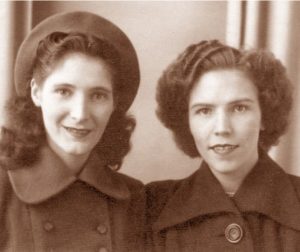
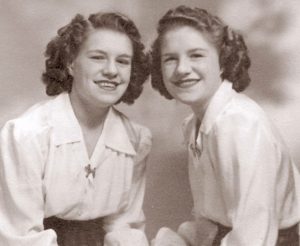
Twin sisters in the hostel
Hostel culture
There was a strong community experience of ‘sisterhood’, with younger girls being supported and befriended by older women. Many of the women married local men, so they were able to maintain the close friendships formed in the hostel after they left, meeting up regularly for the rest of their lives.
‘You canna keep a family on a loaf, but if you share you can have a party’. (1950s)
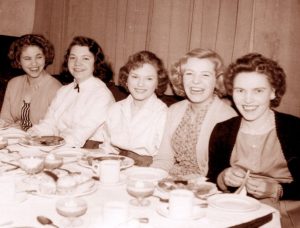
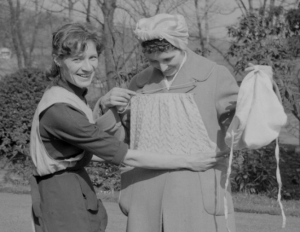
We had a good trading system… [We] used to lend or swap things.’ ‘I would trade my fags allowance for ironing or cleaning.’ (1940s)
‘We were like sisters.'(1940s) ‘Our friendships have lasted over 60 years.’
